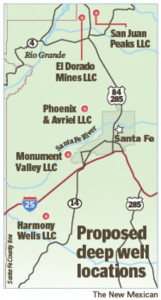Five Wells in Works as Legislature Considers Bill Giving State Authority over Drilling
The New Mexican
Private interests are rushing to tap lightly regulated supplies of briny water deep under New Mexico before the state can adopt new laws aimed at gaining more control over the valuable commodity.
On Monday, five companies with undisclosed ownership notified the state engineer that they intend to drill deep wells in the Santa Fe area and pump out up to 24 billion gallons a year.
They are among various companies that in the past year have been preparing to exploit a rare, unappropriated water supply that underlies the Rio Grande Valley before the New Mexico Legislature considers a bill that could give the state engineer authority over deep wells.
The House Agriculture Committee on Tuesday recommended passage of House Bill 19, sponsored by Rep. Mimi Stewart, D-Albuquerque. However, the bill’s fate is uncertain.
While the state engineer is charged with managing New Mexico’s water, state law contains an exception – wells that tap into aquifers that start at least 2,500 feet below the land’s surface, contain briny water and are disconnected from upper aquifers.
Until recently, only oil and gas companies generally drilled that deep, and they were overseen by the state Energy, Minerals and Natural Resources Department. But the steep cost of treating the salt-laden, deep-aquifer waters has become less of a disincentive to developers and cities as the value of water has risen with semi-arid New Mexico’s population growth.
In the last year, 18 companies have notified the state of plans to drill 190 deep wells and pump up to 345,000-acre feet of water per year. (One acre foot equals 325,851 gallons.)
Among those would-be well drillers are the five limited-liability companies that filed their notices Monday.
The companies, which records show were all formed on the same day last February, are all represented by attorney Michelle Henrie of the Albuquerque firm Atkinson & Thal. The company names are listed as San Juan Peaks, El Dorado Mines, Phoenix & Avriel, Monument Valley and Harmony Wells.
The proposed wells could each pump up to 15,000-acre feet of water a year.
Henrie confirmed Tuesday that she represents the companies, which filed paperwork in both New Mexico and Hartford, Conn. But she did not release any information about her clients.
New Mexico law does not require limited liability companies to disclose ownership, corporate officers or board members, or provide any other information except an in-state address.
Most of the other 150-plus deep wells proposed in the last year are clustered in Sandoval and Bernalillo counties. Only a couple of such wells have actually been drilled in Sandoval County, where the water is expected to serve new developments near fast-growing Rio Rancho.
Last year, State Engineer John D’Antonio warned about the rush to drill deep wells as developers realized the state had no real control over the new water source. But “I couldn’t even get a hearing on deep water legislation,” he said Tuesday.
Stewart’s bill, if it becomes law, would give the state engineer jurisdiction over deep aquifers except for oil and gas exploration, mining, agriculture, electricity generation or geothermal use.
“We’re really targeting residential developers,” D’Antonio said Tuesday. Under the proposal, deep wells would have to go through the same application process and public hearings as domestic well applications.
Companies that want to drill typically notify the state engineer but don’t need a permit to pump. The state engineer has staff on site during the drilling to make sure the well is constructed properly, but can’t stop the well from producing water unless the state can prove other water users are harmed.
“We need to put a tourniquet on new applications,” D’Antonio said, not to stop deep-well development but to make sure they don’t cause lasting harm to other water users.
The deep wells also raise another issue: the ongoing need to better map New Mexico’s aquifers at all depths.
Only once the geology and the relationship between aquifers is understood can the state be sure that new developments and deep wells won’t deplete other water resources.
Stewart has introduced another bill, HB 17, that seeks $450,000 for the statewide aquifer-mapping program.

